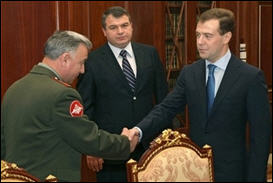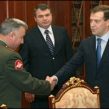
SERDYUKOV ASSUMES FULL CONTROL OF THE DEFENSE MINISTRY
Publication: Eurasia Daily Monitor Volume: 5 Issue: 107
By:

Russia’s top general, First Deputy Defense Minister and Chief of the General Staff of the Armed Forces Yuri Baluyevsky, has been moved to the Security Council, a body that in recent years has been a backwater stopover for ousted high-ranking Russian bureaucrats before final retirement. Baluyevsky, 61, was replaced by Deputy Defense Minister General Nikolai Makarov, 58, who was handpicked for promotion by Defense Minister Anatoly Serdyukov. Announcing the replacement during a televised meeting in the Kremlin with Serdyukov, Baluyevsky and Makarov, President Dmitry Medvedev praised Baluyevsky for his achievements and said that his “experience will be needed at this new post.” Baluyevsky was awarded a distinguished state medal. Medvedev said that while he had “studied and supported” the change, the proposal to replace Baluyevsky with Makarov came from Serdyukov (RIA-Novosti, May 3).
It is not easy to explain to foreigners the true importance of the Russian General Staff. Israel and Turkey have similar powerful military bodies; other NATO member nations do not. The Russian General Staff has full operational and administrative control of the military, including the influential military intelligence organization (GRU). The chief of general staff controls in real time the strategic nuclear deterrent and has, together with the president and defense minister, his own nuclear decision-making authority. The chief of general staff may, in fact, be the only person in Russia with the true power to actually begin nuclear hostilities. Officers on duty in the General Staff who are in charge of forwarding nuclear attack directives to ICBM silos, submarines and strategic bombers, would most likely not take orders from the president and defense minister, who nowadays are civilians, without a confirmation from their own chief. Of course, unlike the time of the Cold War, the threat of a nuclear holocaust today seems remote and irrelevant.
Since 1991 I have been well acquainted with four Russian chiefs of general staff. Over the years I have witnessed constant conflicts between defense ministers and general staff chiefs caused by overlapping responsibilities and jurisdictions. The Russian system of military control and administration works effectively if the defense minister acts as troop commander and the chief of general staff as his faithful staff officer. In real life, such personal loyalty is unusual. The chiefs of general staff that I have known have tended to believe that the defense ministers they served were incompetent fools, and they did not hesitate to express their true opinion.
Chiefs of general staff in Russia often have ambitions to become defense minister themselves. General Anatoly Kvashnin was chief of general staff from 1997 to 2004. Kvashnin was in constant public confrontation with Defense Minister Igor Sergeyev during all of Sergeyev’s tenure from 1997 to 2001 and, in fact, forced Sergeyev out of office. From 2001 to 2004 Kvashnin was in constant public conflict with Defense Minister Sergei Ivanov, apparently hoping to replace him. In accordance with Russian bureaucratic tradition, the best option to avoid constant internal friction is for the defense minister to handpick a personally loyal chief of general staff. In 2004 Kvashnin was replaced with Baluyevsky and sent to Siberia to represent President Vladimir Putin. This ended public discord in the Defense Ministry. From 2004 to 2007 Ivanov and Baluyevsky coexisted harmoniously, but effective military reform faltered anyway.
Serdyukov was appointed defense minister in February 2007 to fulfill a specific mission that Putin believes to be of utmost national importance: to fight massive graft in the Defense Ministry, make defense spending more effective and streamline procurement of new weapons. Under Putin, the defense budget has multiplied as petrodollars have poured into the country. In 2000 it was $6 billion; this year it has been approved at $42 billion and may increase to $50 billion by year’s end. Still, new weapons did not appear and pay is meager. Contract soldiers today get on average $315 a month, while officers get $470 to $590. A recent official Defense Ministry report says that 60 percent of the one million servicemen in Russia are discontent with pay and service conditions (www.mil.ru, April 28).
Serdyukov, a former tax official, has announced plans to employ more civilian personnel and outsource logistic and other support tasks to private businesses. The Defense Ministry has recently publicly auctioned off land near Moscow and collected $156 million to buy housing for officers. According to real estate dealers, the sale was at a fair market price (Vedomosti, May 28). Other similar auctions are pending. Baluyevsky opposed Serdyukov’s reforms and had become the focus of discontent of other top brass (see EDM, March 31).
In the end, the Kremlin sided with Serdyukov. In April 2007 Serdyukov appointed Makarov deputy defense minister in charge of procurement and armaments. Makarov has the right military career qualifications to be accepted as chief of general staff by the military, but his main asset is his presumed loyalty to Serdyukov. Top brass opposition to reforms seems to have been defeated, but positive reform results must be seen soon if massive discontent among the rank and file is to be overcome.




